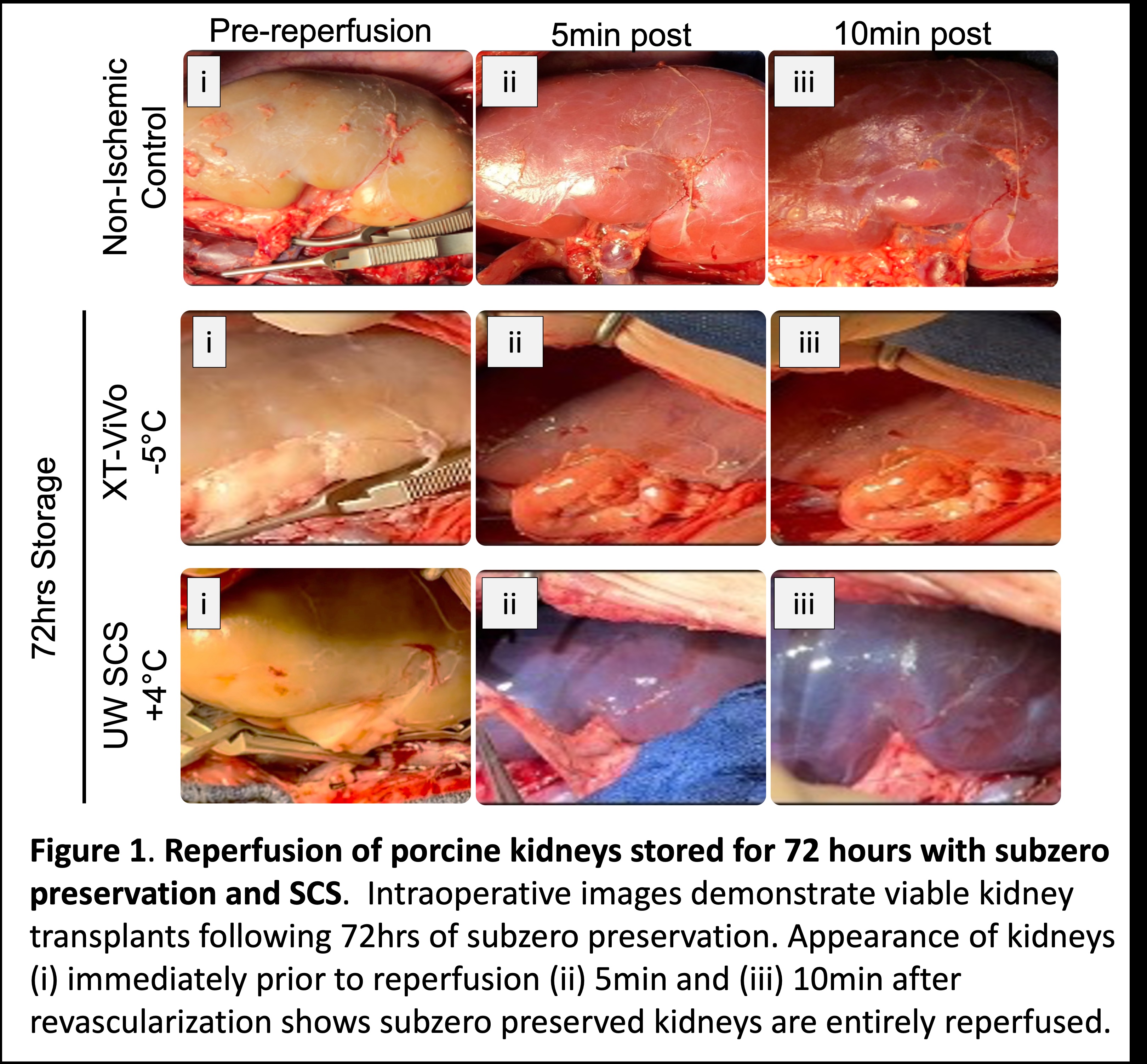
First successful preclinical transplantation following extended subzero porcine kidney preservation with nature inspired cryoprotectants
Amanda Loftin1,2, Yinan Guo1, Heyyoung Kim1, Yichuan Zhang1, Eleni Drivas1, Avi Rosenberg2, Xiaoxi Wei3, Mark Kline3, Byoung Chol Oh1, Gerald Brandacher1,4.
1Department of Plastic and Reconstructive Surgery, Johns Hopkins School of Medicine, Baltimore, MD, United States; 2Department of Pathology, Johns Hopkins School of Medicine, Baltimore, MD, United States; 3X-Therma Inc., Hercules, CA, United States; 4Department of Visceral, Transplant and Thoracic Surgery, Innsbruck Medical University, Innsbruck, Austria
Introduction: Successful transplantation of human-sized organs following extended subzero preservation has never been achieved due to freezing damage caused by ice crystals. Inspired by naturally occurring antifreeze proteins, we created XT-ViVo, a non-toxic, serum- and protein free organ preservation solution containing a novel peptoid anti-icing agent. Here we provide first evidence that XT-ViVo, in combination with a novel subzero organ storage and transporter, TimeSeal, significantly prolongs ischemia windows and maintains renal function in a life-supporting large animal transplantation model without changing the peri-transplant workflow or adding complicated equipment to the operating room.
Method: We assessed subzero preservation of kidneys with XT-ViVo and TimeSeal in a pig renal autotransplantation model. Kidneys were preserved with XT-ViVo at -5°C or static cold storage (SCS) for 0, 24, 48, and 72 hours and transplanted. The native kidney was resected at the time of transplantation and renal function of the preserved kidney was assessed until endpoint (30 to greater than 100 days post-transplant).
Results: Transplantation of subzero preserved kidneys stored for up to 72 hours restored normal renal function and solely sustained the lives of nephrectomized pig recipients for over 100 days. Intraoperatively, kidneys preserved with XT-ViVo at -5°C for 72 hours reperfused rapidly and homogenously, were more likely to produce urine (XT-ViVo 4/4; SCS 1/2) and had a shorter average time to urine production (XT-ViVo 240sec; SCS 840sec) (Fig 1). Post-operatively, kidneys preserved for long time points of 72 hours at -5°C showed an initial period of early graft dysfunction that resolved after up to 21 days at which point metabolic parameters were within normal range, and serum creatinine returned to near baseline in pigs (normal range: 0.5-2.7mg/dl; XT-ViVo 4.2; SCS 19.2). Endpoint urine samples from recipients of kidneys stored at -5°C had no hematuria, proteinuria, or glycosuria. Histomorphologically, subzero preserved kidneys were similar to non-ischemic controls.
Conclusion: This is the first demonstration in proof of principle transplants, that normal long-term renal function is possible following extended subzero organ preservation. The peptoid preservation solution and a static subzero organ transporter provides a clinically translatable system that significantly extends organ preservation without modifying peri-transplant workflow.

[1] Organ Preservation
[2] Subzero Preservation
[3] Kidney
[4] Kidney Transplant
[5] Preclinical Model
[6] Cryoprotectant
[7] Pig Kidney
[8] Ischemia
